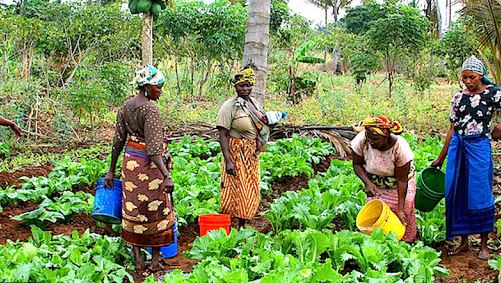Women play important role in the nation’s agricultural value chain. Most of them, who are mostly smallholder farmers and processors, account for about 70 to 80 per cent of the sector’s labour force. Despite their contributions to the nation’s food system, these farmers seem not to have the necessary support, needed to boost productivity and contribute better to the country’s economy the way they would have done.
FarmingFarmersFarms spoke to some women farmers and processors, as they called on governments at both the federal and state levels to carry them along in their various policy formulating and implementation efforts. They further called for the establishment of processing hubs across local governments, better funding, regular training and support, and the implementation of gender policy enhancement. They advised the government to involve more women in decision-making roles and avoid making decisions on their behalf that do not meet their needs. The National President, Small-Scale Women Farmers Organisation in Nigeria (SWOFON), Mary Afan, said that, “Most of the time, those in government just sit down to plan on our behalf and that is why they don’t really understand what we want.
“They should engage us so that we can tell them what we want and how we want it”, she said. Afan called on the government to implement the gender enhancement policy, which says 35 per cent of all inputs should be given to women, stressing that if this is done, it would go a long way in boosting farming. She also urged the government to priotise agriculture and increase budgetary allocation to the sector to achieve food security. The Chief Executive Officer of ChiTola Farms Limited, Chi Tola Roberts, said that the government needs to invest more in creating agro hubs, which should be accessible and affordable. She said women farmers should be engaged in the discussion that, their needs should not be provided for them on assumptions.
“Government should find out what they need, where they need it, and how they want it. By engaging these women, a lot will be extracted to help in proper, women farmer-friendly policies, to be developed and implemented. The truth is, if a group of women for example, in a community prefers their processing hub at the back of the community market, when it is put there, it will be of immense benefit and will be used optimally. You can’t possibly set a processing hub in a community where the women can’t easily transport their produce by head, bike or even small trucks, considering the fact that most of these smallholder farmers are located in communities where there is not a good access route”, she said and added that, women farmers require access to improved services and facilities because they contribute immensely to agricultural and agro processing activities in this country.
The General Secretary of the All Farmers’ Association of Nigeria (AFAN), Lagos State Chapter, Abimbola Francis, called on governments at the various levels, to make available, processing hubs for women farmers at their communities so that these farmers would bring their produce to the hub for processing. She also noted that women farmers needed machinery and farm implements to make their farming business easy and less tedious, adding that for the nation to be food secure, women farmers have a role to play, which they have been playing, and should be supported with an irrigation system.
The Chief Executive Officer, Arcom Treasures, Aolat Idowu-Agbelekale, said women’s contribution to the nation’s Gross Domestic Product (GDP) was awesome and that, they require special attention and support in terms of equal opportunity to finance, patronage, favourable decision and policy, as it affects their lines of operations and businesses. She said that the government should provide the needed, enabling and secure environment for women farmers and processors to thrive for “We need grants, zero interest rates on loans, and equipment financing. Farm land allocation at reduced price as well as farm inputs support such as seedlings and fertilizers, among others”.
Idowu-Agbelekale, who is a stakeholder in the coconut value chain, said that there is the need to build more processing centres that would allow for equipment sharing and reduce the multiplication of efforts and wastage. “Most often; one waste product in coconut is another raw material for another coconutpreneur. For example, activated charcoal processor uses the waste shell of coconut oil producer. If we are in a cluster, it makes it easier for such processors to get his/her raw materials at affordable prices and easily”, she added.



